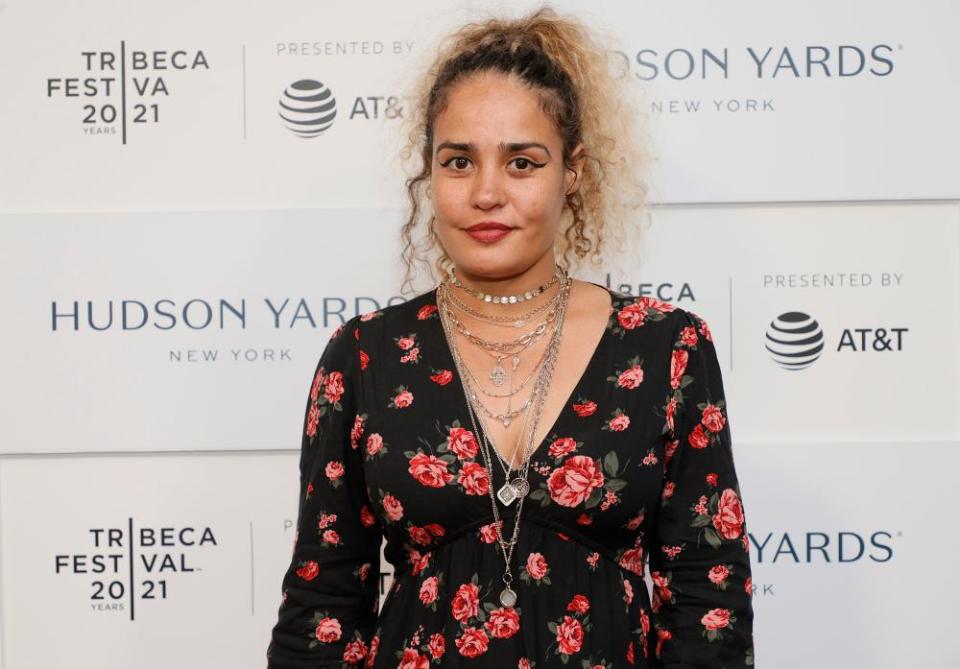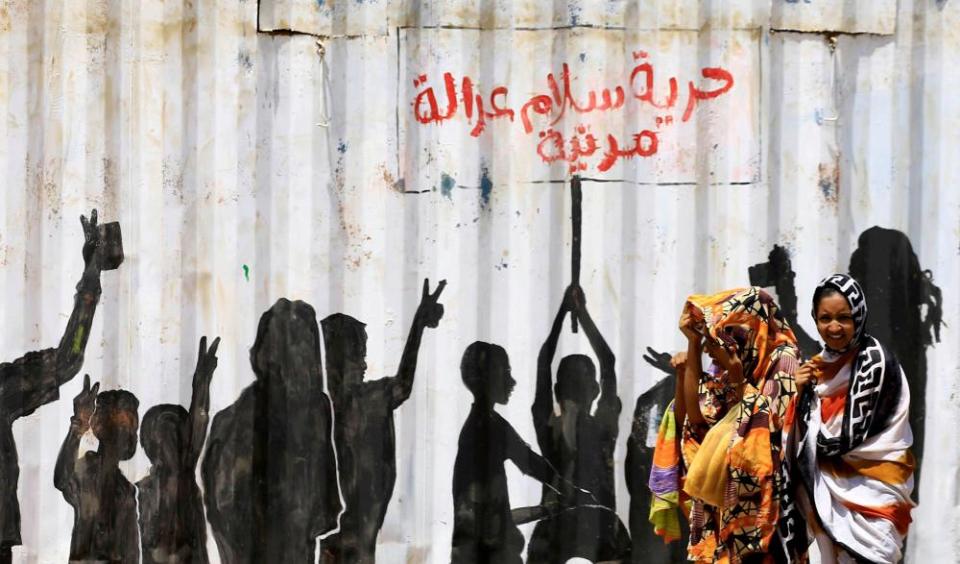Can artistic freedom survive in Sudan? The writing’s on the wall…
The recent coup dashed hopes raised by the end of the military regime but newly liberated artists refuse to submit quietly
In the new dawn of a heady post-revolutionary era, Suzannah Mirghani returned in 2019 to the country of her birth for the first time in years. Her mission was to shoot a short film on Sudanese soil. It proved unexpectedly straightforward.
“When the revolution happened, there was this exuberance,” she says, from her Qatari home. “When we came to make our film, we were given the green light. We were told: ‘Anything you want’.
“Nobody harassed us. Nobody told us what to do. Nobody asked us for the script. I call this time in the history of Sudan ‘the honeymoon’,” says Mirghani.

More than two and a half years after the toppling of the longtime dictator Omar al-Bashir, Mirghani fears the honeymoon is over, at least for her. The turmoil into which Sudan has again been plunged means she feels unable to return safely.
On 31 October, as her film, Al-Sit, won the latest of many awards, Mirghani had to give an acceptance speech that was anything but celebratory.
Six days before, the military had seized power in a coup, detaining the civilian prime minister and bringing the country’s fragile transition to democracy to an abrupt halt.
In a video address from Qatar to the Africa in Motion film festival in Scotland, Mirghani said “the only reason” she and her crew had been able to make Al-Sit was the active encouragement given by the civilian-military partnership government. “Now,” she added, “we’re in very serious danger of going back to the bad old days of military rule and stifling creative expression.”
Since the coup, a lot has happened: huge pro-democracy protests thronged through Khartoum and other cities, with at least 40 demonstrators killed.
After almost a month, the prime minister, Abdalla Hamdok, was released as part of a deal struck with the coup leader, Gen Abdel Fattah al-Burhan.
But the protesters, who want the military out of politics for good, are not convinced, and even less so as security forces fire teargas into the crowds that continue to gather despite Hamdok’s return. With the creative gains made after the revolution now hanging in the balance, Sudanese artists feel they have to speak out.
“We artists will be the first to be targeted if the military government continues in power,” writes Aamira*, a painter, in an email from Khartoum. “We are demonstrating in the streets, facing guns, unarmed. There is nothing to fear any more.”
In an interview with the Financial Times last week, Hamdok defended his decision to strike a deal with the military, saying it was essential to stop the bloodshed and “preserve the achievements of the last few years”.
It may not have been uppermost in his mind, but one of those achievements was the flowering of an artistic community that had long been harassed, censored and forced into the shadows. Assil Diab, a street artist, says: “I painted Omar al-Bashir as the [face of] coronavirus in a stadium in Bahri during the daytime, which would have been just impossible; my whole family could have been killed two years ago.”
Feeling compelled to return amid the revolutionary fervour, Diab returned to Sudan in 2019 and made her name painting the faces of the revolution’s “martyrs” on the outside of their families’ homes, with a getaway car close by in case the notorious paramilitary Rapid Support Forces saw her.
For Mirghani, the “absolute elation” of the revolution yielded creative results. Al-Sit is the beautifully observed story of a Sudanese village girl whose parents want her to marry the sharp-suited son of a wealthy cotton trader in Qatar. “To finally be able to express yourself, to say what you had wanted to say to these people for 30 years: it’s amazing.
For the first time in 10 years, I’m in Sudan walking around, not scared of any police, or secret police
Khalid Albaih, political cartoonist
“My film is about women’s rights. It’s social commentary on arranged marriage. I don’t think we could have said that a few years ago,” says Mirghani.
The “honeymoon” was not without its challenges. The dictator was gone, but social and religious conservatism – and a reluctance to champion the arts – remained. Artistic freedom was patchy: in 2020, the renowned film-maker Hajooj Kuka and several others were detained during a theatre workshop.
Asim*, a documentary film-maker in Khartoum, says that, although in the capital the “direct censorship” of the Bashir era has eased, the rest of Sudan is not as relaxed. “It’s partially freedom and partially censorship,” he says. “It is a battle about 10% won.”
Khalid Albaih, a political cartoonist based in Qatar, returned after the revolution to launch the Sudan Artist Fund (SAF), to provide budding creatives with money and mentors, and with an ambitious plan to create a public art and design library. He says: “I thought: this is it. All doors were open and this is what we were going to do.
“I took all my papers, and for the first time in 10 years I’m in Sudan walking around, not scared of any police, or secret police, or anything. I went to every business owner in Sudan and everyone that can donate money to these causes. And I got nothing but rejection – for a library and for an artists’ fund.”
Finally, Albaih secured $7,000 (£5,300) from CultuRunners, a cultural exchange organisation, and the SAF awarded its first grant of $500 in October – just before the coup. “It was incredible because the internet cut out [after the coup leaders imposed a nationwide online blackout] so the artist didn’t even know he had won. We had to call him. It took two or three weeks to send the money to him,” says Albaih.
The cartoonist knows there will not be any more funding for a while. “Now everything is rocky. No one knows how things will go. It’s going to be really hard for artists and these kinds of initiatives to move forward.

The coup, says Diab, left the creative community feeling “disappointed and just broken down … because we finally thought we were free and then this happened.” She intends to apply for political asylum in the US, where she is studying, feeling she “can be of better use to Sudan” from overseas.
Those in the thick of it cannot afford to give up hope. Asim was at a protest in Khartoum against the post-coup deal last week and was “teargassed the entire afternoon” amid chants of “no partnership, no negotiation, no legitimacy”. He is realistic about future challenges but knows that people have made up their minds.
Related: Sudan military agrees to reinstate PM and release political detainees
“I feel like there is a grip on power and it will not end today; it will not end tomorrow. Whether those power-hungry authoritarians will roll with democratic transition and allow people to express their freedoms, allow journalists and film-makers to operate or not, that is something that is still [up in] the air, because you never know with the ever-changing dynamic of power in this country,” he says.
The momentum towards democracy is undeniable, he says. “I believe that is possible and I believe there is hope. The people will not stop asking for what they really want. [Will] that future come tomorrow? The day after? In two years? In five? We never know. But it seems like the consensus is that people agree it has to happen.”
*Names have been changed to protect their identity
Sign up for a different view with our Global Dispatch newsletter – a roundup of our top stories from around the world, recommended reads, and thoughts from our team on key development and human rights issues, delivered to your inbox every two weeks:

 Yahoo Finance
Yahoo Finance 